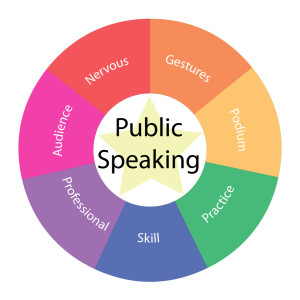1. Relax and Breathe
If you’re feeling nervous remember to breathe deeply! Even if you don’t have much time 4 or 5 deep breaths can really help to calm the nerves.
Your voice is very sensitive to your emotions. If you are nervous or anxious or tense it will show when you speak. This can restrict the sound you make and potentially cause problems like sore throats, or losing your voice. By learning to relax and breathe from the diaphragm you can find more control in your voice and develop a good support to help you project.
2. Put your body in a strong position
This will make you look and feel more confident. Stand straight with feet secure on the ground – imagine that your feet are growing from the ground. Keep the spine straight and the head upright – imagine a string pulling from the back of the head making you stand tall. Keep your shoulders relaxed – hanging like a coat-hanger – arms able to swing and not held. Keep your knees soft – locked knees lead to tension.
3. Break it down
Once you have decided what you’re going to say, break it down into sections. Each new section will have a new thought or energy and you can use your voice to indicate when one idea ends and another begins. By doing this you can identify where you might pause and help to bring expression to your delivery.
4. Find a Clear Objective
Giving a clear objective for your speech can help you to be precise about what you’re trying to say and how you’re going to say it. Your objective is what you want the audience to take away with them. Try to make it active and not passive and use the phrase ‘I want you to…’
Consider the following….
- What is the main purpose of the piece?
- What do you want to achieve?
- What do you want your audience to do or retain?
- What are the main points and sub-points?
The most important thing before presenting is to practice out loud as much as you can. By practicing you are less likely to forget and will have the chance to change it around and make it better. Don’t be tempted to practice it in your head – it’s not the same – you need to feel and hear the words for your brain and body to remember it better.
For more information on our One2One coaching on presentation skills, please click here.


